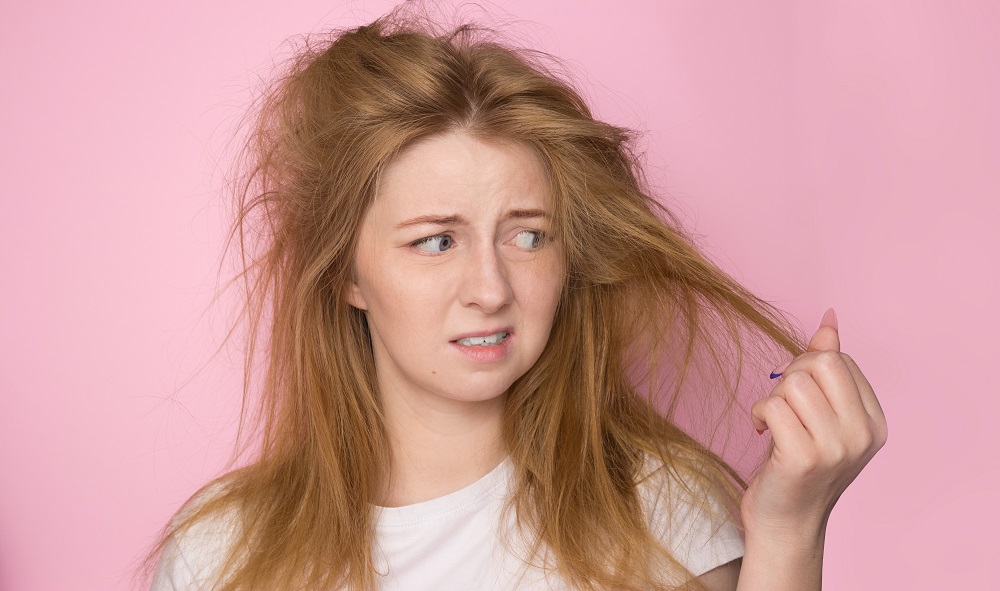Do you know what’s hiding in your water? There can be elements in your shower water that are out of range causing adverse health effects for your whole family. If dry skin, dry hair, skin irritation, skin breakouts, hair damage, hair breakage, or hair loss are common complaints in your home, we may have found the solution for you – a shower filter!
After moving into our new home, the last thing I was thinking about was our water quality. We had good pressure, crystal clear water, and no air bubbles so we thought we were in the clear – until one after another the signs started to show. It started with me getting dryer than usual hair, than hair loss like never before, skin irritation, and the icing on the cake was burning sensation if you took a longer shower or bath. We knew something was wrong!
After doing my own research, I started to learn that even though your water passes your local requirements, it doesn’t mean what’s coming out of your showerhead isn’t harming your hair, skin, and health! With the biggest culprit being chlorine and heavy metals, we had to find a way to drastically lower these levels which led us to shower filters.
Below I’ve included our personal research and tests that we used to make our decision on which shower filter to go with, and if you are experience any of these water issues we hope they help you too!
What’s Harming Your Hair, Skin, & Health In Your Shower Water
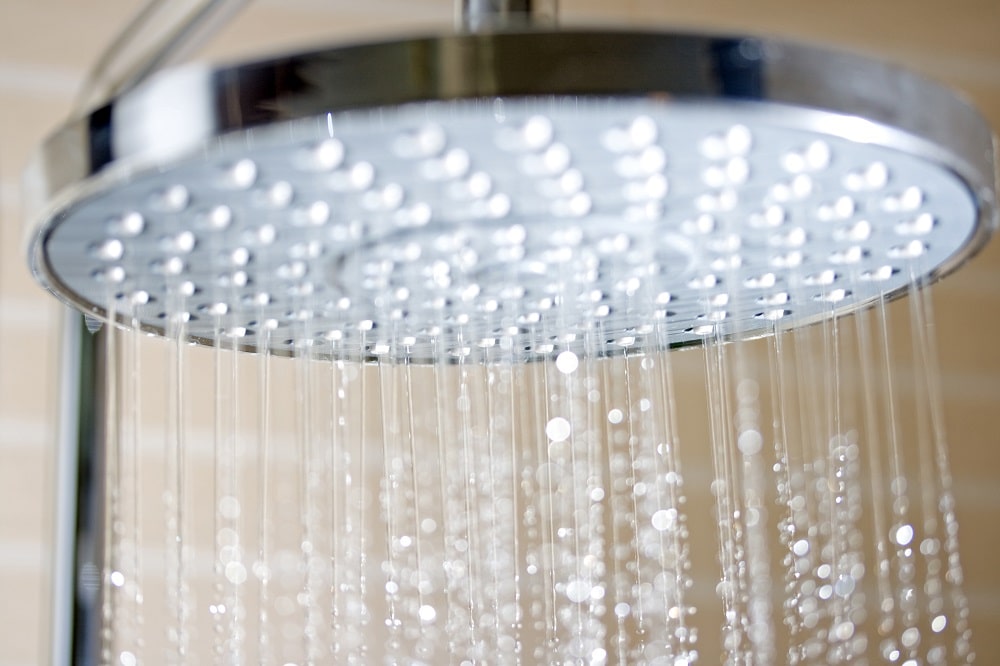
There are many elements that can affect the safety of your water, but if we want to single out what most effects hair and skin, we care about your total Chlorine level, as well as if you have hard water with high amounts of heavy metals in them.
Chlorine: Chlorine causes a wide range of health effects from dry and itchy skin to stomach cramps, vomiting and diarrhea. Although these are uncommon, one thing more commonly seen is when there is too much chlorine in your water, it will absorb your hairs natural oils and leave your hair extremely dry and damaged.
This could lead to hair thinning, and in my case, losing what seems like huge chunks of hair every time I shower.
Heavy Metals / Hard Water: Our test strips sort these all out individually, but for our purposes, we will group these under heavy metals, or commonly referred to as hard water. The metals can be any combination of Copper, Iron, Lead, Nickle, Arsenic, Cadmium, Chromium, Manganese, and Mercury and can have a detrimental effect on your health, hair, and skin if you are commonly exposing yourself to them.
The heavy metals generally get into your drinking or shower water through decaying pipes and plumbing systems, or straight from the water entering your home. This is from metal waste products seeping into ground wells and aquifers as well as land disruptions from development.
Does your shower head end up looking like this between cleanings? Mine did, and its a tell tale sign that you have hard water!
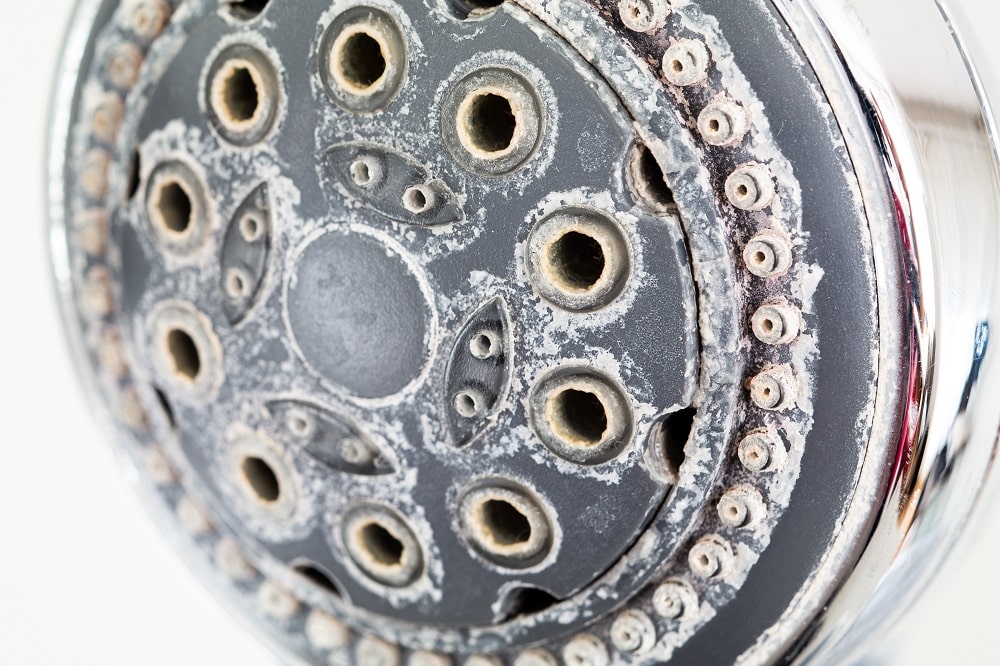
While in moderation, exposure to most of these metals isn’t harmful, but like most, you’ll run into trouble when you are continually showering and drinking them day after day (like I was).
Continual exposure to heavy metals can lead to a range of symptoms, including hair loss, brittle hair, premature graying, and skin rashes. Heavy metals like lead, cadmium, and mercury can also disrupt the production of collagen (a protein that’s essential for healthy skin) and cause oxidative damage to the skin cells leading to skin irritation, acne, eczema, and psoriasis.
Long story short, we need to take heavy metals seriously and get them out of our shower water!
What’s a Shower Filter & How Do They Work?
So now that we know our shower water can be contaminated and effecting our hair, skin, and health, what can we do about?
In comes the shower filter – the cheapest and most immediate option for hair and skin relief!
A shower filter is a device that sits between your shower water line, and your shower head that can filter out impurities and contaminants from the water. Most shower filters contain a tightly packed internal carbon filter, and because the filter sits between your water pipe and your showerhead, the water will first run though the carbon filter before leaving the showerhead. The filter can help catch and remove chlorine, heavy metals, and other harmful chemicals – making for a much safer shower experience which can have a range of benefits for your skin and hair.
How We Conducted Our Tests To Find The Best Water Filters
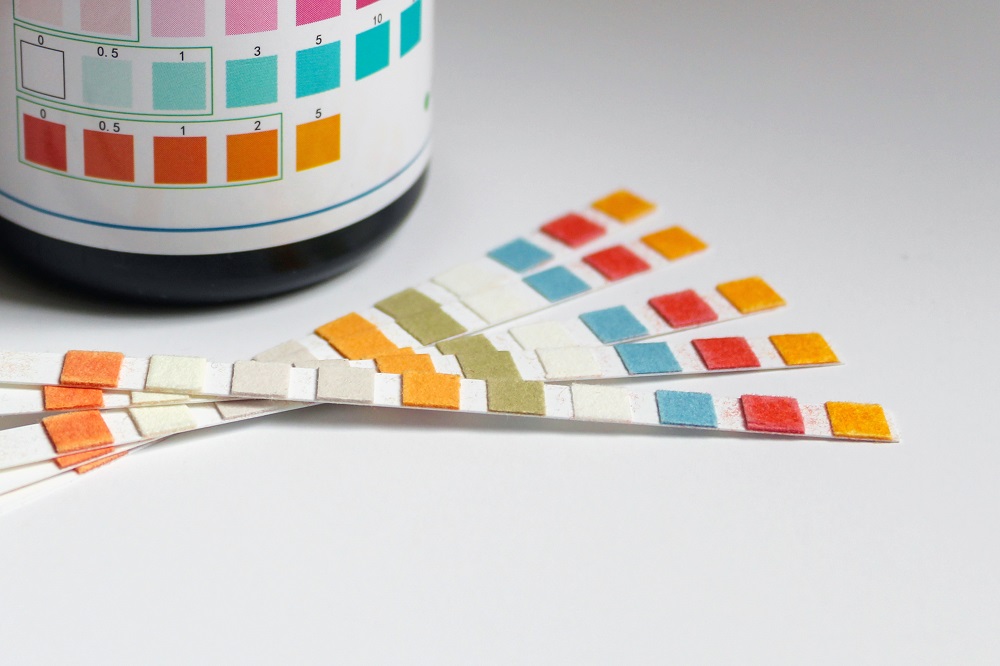
Now this is the fun part! Because of my hair loss, acne, and general burning feeling coming from my shower water, I knew it was contaminated, but by how much?
To get an understanding of what’s in my water I chose to go with drinking water test strips (see below for a more detailed explanation of the strips). When it comes to testing, you really only have 2 options, one is taking samples of your water and shipping it off to a lab (expensive and time consuming), or you can do a home test like we did. The test strips will give us a general idea of what’s in our water, and will help highlight anything that’s jumping off the charts.
To test the water, I took off the showerhead, ran the water for 30 seconds, filled up a clean glass cup, and stuck the strip in for 2 seconds (that’s what the test strips directions called for). After taking the strip out and waiting around 15 seconds, you’ll notice an array of new colors. All these colors correlate to one tested element each, and you can compare the color your test strip turned to the key / ideal range that’s provided with the kit to see how your water stands.
The graphic below shows my actual test results! On the left, these colors show the idea range your water should be in (this range was supplied by the water testing kit), and on the right, I have circled what my test strip read with no shower filter on. I’m going to call this our water baseline.
Many of the tested elements did end up being in range, but don’t forget this test is technically for drinking water, and some of these elements aren’t as important. What we really care about is the Chlorine levels, the total hardness, as well as if we have any of the individual metals in our water like copper, lead, iron, and nickle.
Using our baseline water test, you can see we’re on the higher end for Total Chrloine, Hardness, as well as high on some of the individual metals such as Copper and Lead.
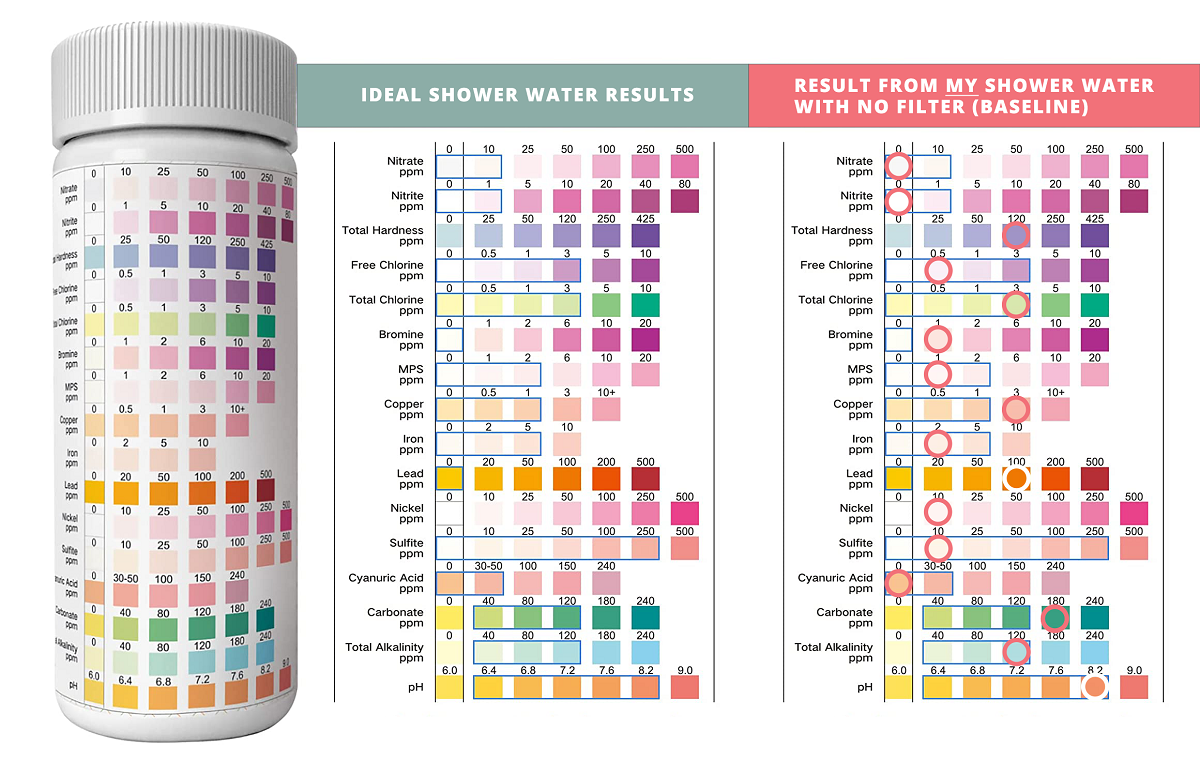
Now that we know what kind of water contaminates we are working with, we were able to start testing water filters to find which worked the best in eliminating what’s been hurting our hair and skin!
Our recommendations are based on which filters best lowered the water contaminants, as well as bunch of other things like price, ease of installation, filter replacement cost, durability, and aesthetics.
Lets jump right into the results and our recommendations!
Aquasana Shower Water Filter – Best Overall Water Filter For Hair & Skin
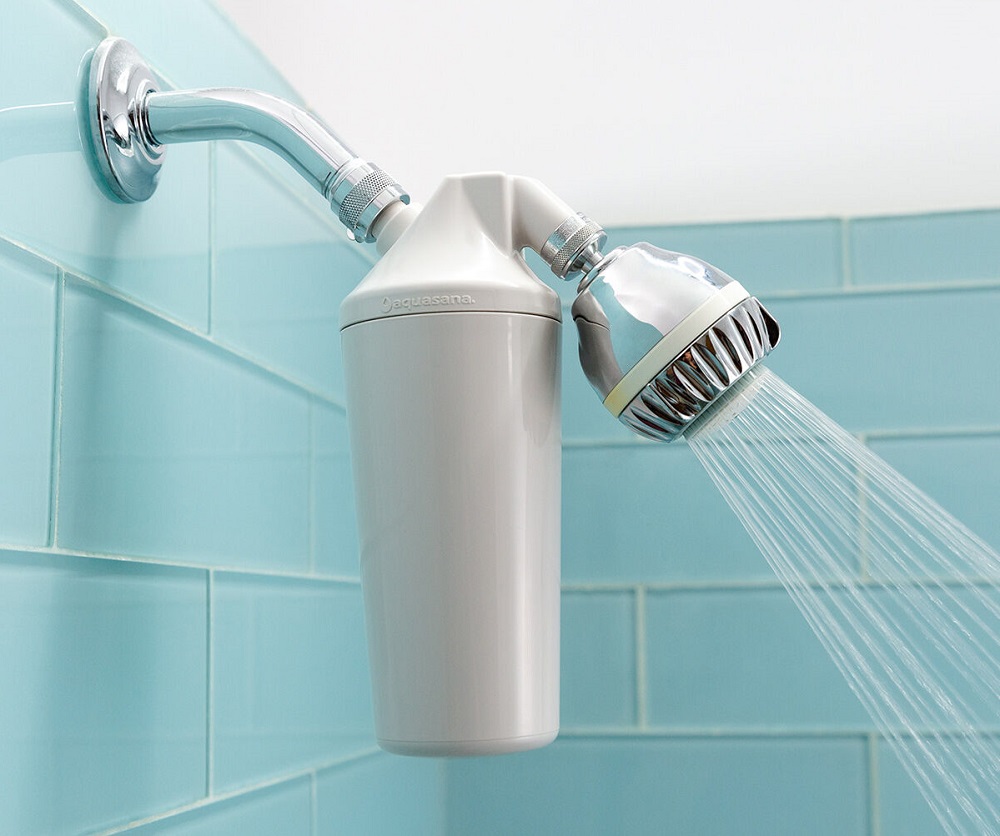
Like most of the filters we tested, the Aquasana was super easy to install. Because we already had teflon tape on the shower arm, it was out of box, screwed in, and water running through it in less than 2 minutes.
The entire unit is a bit larger than most shower filters, but because of its upflow design which no other filter we reviewed had, it can push the water down through the filter, and then also get the benefits of pushing that water back up through the filter a second time before it comes out the showerhead. The internal filter itself is a layer of natural coconut shell carbon to reduce chlorine, lead, iron and other harsh chemicals, as well as a layer of copper & zinc media to further reduce chlorine and enhances your water’s PH balance.
Filter type: All-in-one
Filter price: [amazon fields=”B0016BS9T6″ value=”price”]
Flow rate: 2.5 gallons per minute
Filter capacity: 10,000 gallons
Filter replacement cost: [amazon fields=”B000YFD6WU” value=”price”] every 6 months
Aquasana Shower Water Filter’s Test Results:
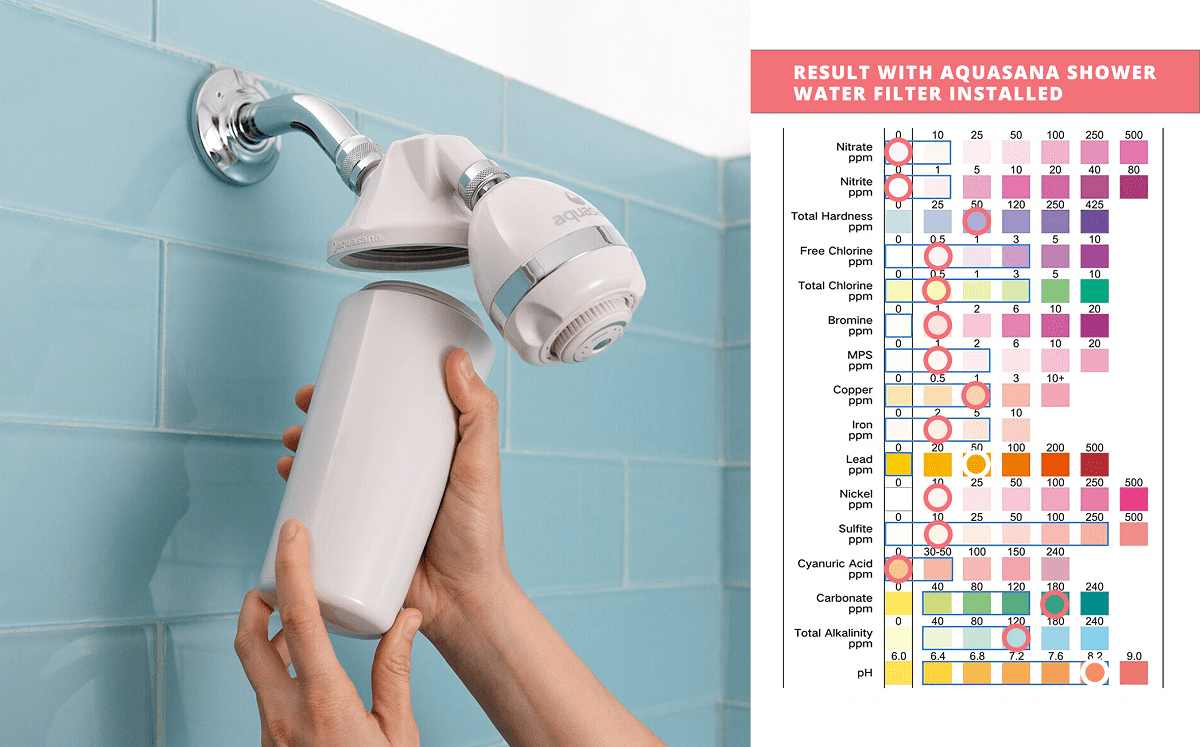
The Aquasana did a great job bringing down our Total Chlorine from 3 to .5, it also did a good job bringing down both Copper and Lead which were originally high. Overall the Aquasana performed the best in our testing, and we believe its worth the few extra dollars to save your hair and skin.
What We Liked:
- The Carbon and KDF Filtration Media does a great job. We also love that the water passes through the filter twice.
- While the design isn’t as sleek as other filters, it felt more study, and all moving ends/parts felt like they had a tight fit which will result in less leaks.
- After testing for a week, our hair and skin felt the best of any filters.
What we Didn’t like:
- Filter replacement is the most expensive out of all reviewed filters.
- Some users reported issues with slowing water from the filter becoming clogged.
AquaBliss High Output Revitalizing Shower Filter – Best Budget Shower Filter For Hair & Skin
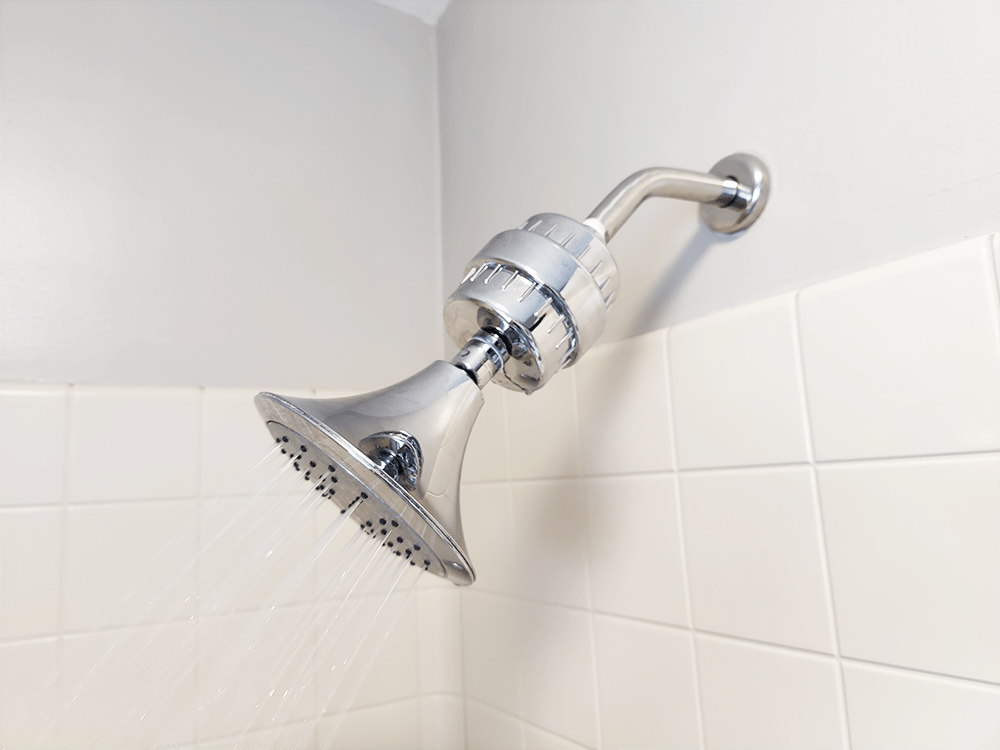
The AquaBliss High Output Revitalizing Shower Filter is the #1 selling shower filter on Amazon for a reason! Another easy install filter, this one filters out contaminants with Micro-porous PP cotton, Calcium sulfite, Redox media, and Activated carbon, while at the same time adding rejuvenating ingredients into the water to support healthy hair, skin, and nails. You get all of this from the filter for under $40, its a no brainer.
This filter feels solid, and its chrome finish matches well if you have a chrome showerhead.
Filter type: All-in-one
Filter price: [amazon fields=”B01MUBU0YC” value=”price”]
Flow rate: 2.5 gallons per minute
Filter capacity: 10,000 – 12,000 gallons per filter
Filter replacement cost: [amazon fields=”B075L81JP5″ value=”price”] every 6 months
AquaBliss Shower Water Filter’s Test Results:
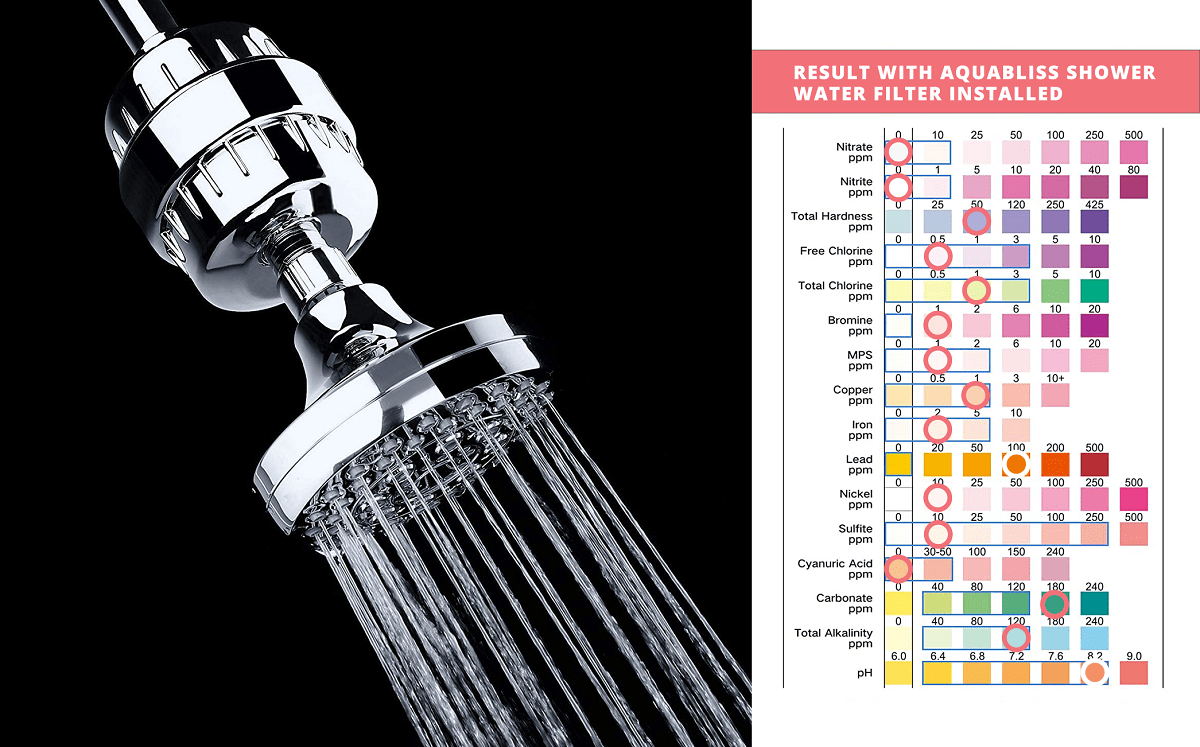
The AquaBliss was able to reduce our Chlorine, total hardness, and copper water numbers. For the price of under $40, you cant ask for much more. This is a great filter if you’re on a budget but still want to make a positive impact on your water quality.
What We Liked:
- Great price for the results. If you want to improve your water but on a budget its a no brainer.
- Reduces contaminants in your shower water while also adding in beneficial vitamins and minerals.
- Easy and straight forward installation.
What we Didn’t like:
- We had a little trouble with leaking after installation. It took a little work and tightening to get this resolved.
- Only comes in chrome and looks a bit bulky once installed.
TESPERT Water Test Strips
Below you’ll find all the info on the test strips we used to conduct our water testing for each filter and to get our baseline numbers. We tried to balance price, accuracy, and the amount of elements the strips with test for when choosing the ones we wanted to go with.
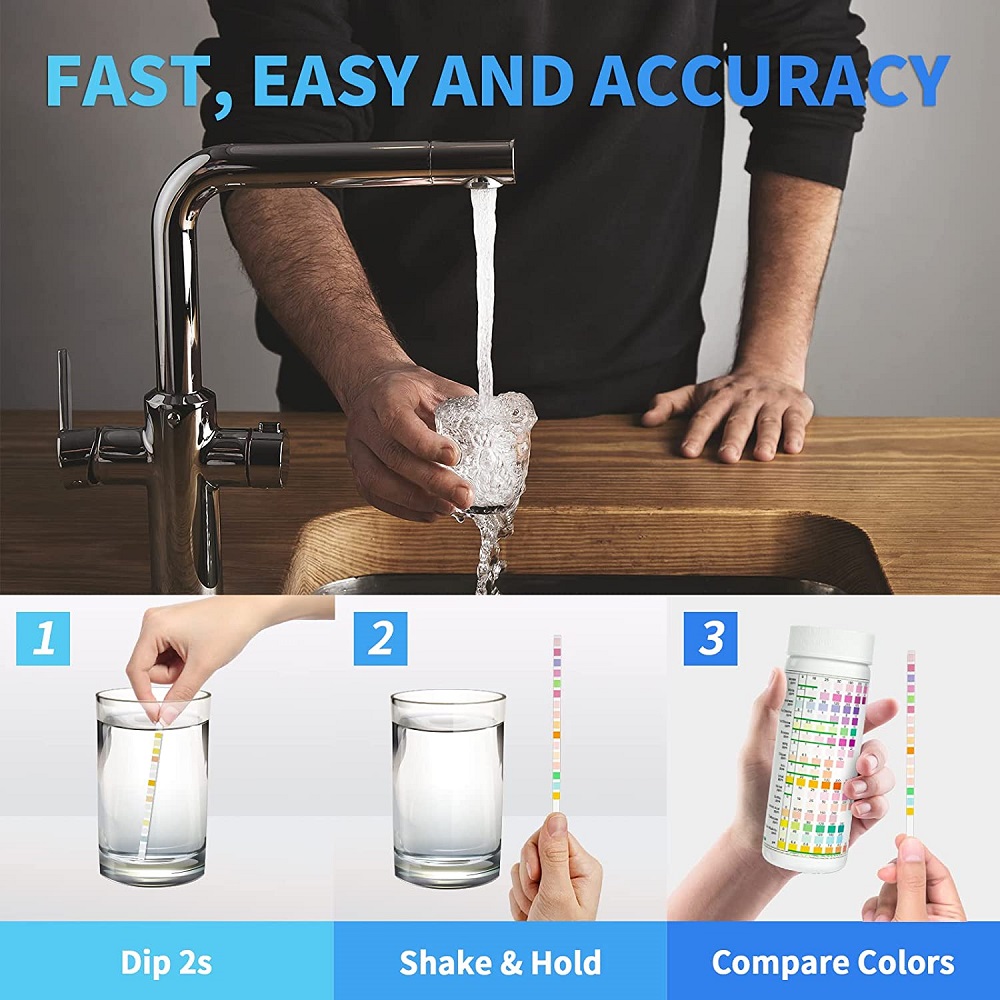
Price: [amazon fields=”B0BG63JJ3T” value=”price”]
The Strips Will Tests For 16 Elements: Nitrate, Nitrite, Total Hardness, Free Chlorine, Total Chlorine, Bromine, MPS, Copper, Iron, Lead, Nickel, Sulfite, Cyanuric Acid, Carbonate, Total Alkalinity and pH
What We Liked:
- Easy to read results. It says right on the strips where the safe ranges are.
- Test results appeared in under 15 seconds and the ink did not run!
- Cheaper than typical home water testing services. They range anywhere between $25-$500.
- These test strips can test drinking water, pool water and hot tub water.
What We Didn’t Like:
- Doesn’t state what the results mean, just if they were at, above or below safe levels. We had to google each element for more information that we included in this post.
- The test is just a test. It doesn’t assist you on what you need to do to fix your water. If your test shows something problematic, you’re going to be spending more money to fix it.
- We had to buy way more than needed. We don’t need to test our water 125 times to fix it; hopefully! Nor do we have a pool or a hot tub. We’ll likely lose the remaining tests before we test again next year, but it is nice to have extra on hand if your experience is more cumbersome than ours.
All in all, we’ll be using our TESPERT strips again. Not just because we have a bunch on hand, but it’s been a cheap alternative to fixing our tap water. We didn’t want to splurge on using a professional when our reasonings for wanting to test our drinking water were not hazardous to our health. If you or a family member are experiencing serious health complications you believe are being caused from your tap water, please seek a professional’s help.
5 Reasons Why You Should Test Your Water Quality
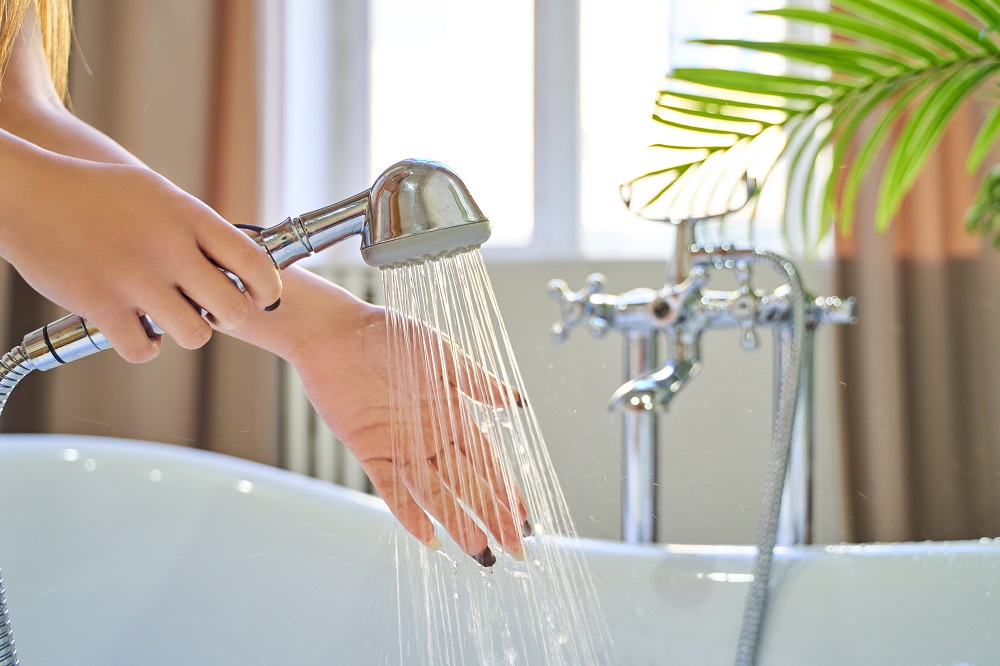
Testing your water quality sounds like a good idea, but hardly anyone does it before a major health problem arises. Here are five reasons why you should test your water quality this weekend:
1. To Prevent Serious Health Problems: The most common health problem caused by contaminants heard of in the United States is lead exposure in children. It happens in ways that are more than ingesting lead paint. It can also happen to babies who consume baby formula prepared with tap water some or all of the time. Boiling the water used to prepare the formula cannot remove lead. Often families don’t even realize they have lead pipes that are leaching into their water until there is already significant exposure.
2. To Avoid Or Resolve Hair Dryness, Damage, Breakage & Loss: Are hair problems a common problem in your home? It may be worth doing a water test! Hair dryness, damage, breakage and loss can be caused from a myriad of underlying health conditions like vitamin deficiencies, hypothyroidism, PCOS, genetics, pregnancy, medications you’re on and more. If you’re up to date on your annual medical appointments, expressed your concerns while you were there and you’re not the only one at home with hair problems, it may be your tap water.
3. To Solve Skin Dryness, Irritation & Breakouts: Like hair problems, skin problems can also be from an underlying health condition. However if it seems like no matter what you do your skin is always dry or irritated, it could be your tap water. Hard water can indeed cause dryness, irritation, and breakouts.
4. Most Water Pollutants Don’t Have An Obvious Smell, Taste Or Color: Water that looks clear, doesn’t smell bad, tastes okay or comes in from a source you trust (like your city water) means that said water is necessarily safe. In fact there’s many contaminates that aren’t easily detected by our senses that could cause health problems.
5. For Peace Of Mind That Your Family Is Safe: No one wants bad test results! But water tests often come back with issues that need to be fixed. Nearly half of water tests completed fail at least one drinking standard. If nothing else, testing your water will give you the peace of mind that your water is safe to use.
Shower Filter FAQs:
1. What types of contaminants can a shower filter remove?
Most shower filters will be able to remove elements such as chlorine, heavy metals, and bacteria that can effect your skin and hair. Higher end filters will obviously be able to filter out more of these harmful elements.
2. Are shower filters easy to install?
Most in-line (like the ones tested above) are very easy to install. Generally, you just need to unscrew your current shower head, add Teflon tape to help stop any leaking, screw on the new filter, and then screw your original shower head to the new shower filter. Most filters will come with the Telflon tape, and the only tool you might need is a channel lock or pair of pliers to loosen and tighten the filter/shower head.
3. How often should I replace my shower filter?
Shower filters tend to last anywhere from 3 months to 12 months and the filter you purchase should let you know their recommendation. The replacement period will also be affected by how often your shower is running. If you have a family of five that each take a shower daily, you will most likely need to replace the filter before the recommended time frame. Because I have a high level of chlorine in my water, I can usually tell by how the water feels on my skin when its time to replace. The water will start to give me burning sensation when the filter has little life left.
4. How much do replacement shower filters cost?
Filter replacement pricing is going to be different for each different type and brand of shower filter. For the examples above, the replacements filters cost anywhere from $5 to $40 and last anywhere from 3 months to 12 months. If you like your filter, I recommend seeing if there is a discounted price if you purchase multiple replacement filters at once.
5. Are shower filters compatible with all showerheads?
Of all the in-line shower filters we reviewed and tested, our standard shower head fit them all. The standard size of the shower line 1/2 inches, so all shower filters and shower heads should be the same. You should no issue screwing your existing shower head onto a filter.
6. Can a shower filter affect water pressure?
A shower filter should have no effect on your water pressure if installed and replaced in proper intervals. The only known instance of this happening is if your water is heavily contaminated, filling your filter, and slowing the cleaning process. You wont notice this though if you change your filter regularly.
Make sure your shower filter matches or exceeds your shower heads flow rate. Most filters and shower heads are rated for 2.5, 2.0, 1.8, and 1.5 gallons per minute flow rate. If you put 1.5 GPM shower head on a 2.5 GMP shower filter, the water flow might be slower than expected, but that’s because the showerhead is designed to slow the water flow.
7. Can a shower filter remove hard water deposits?
Shower filters wont technically wont turn hard water into soft water, you will need a whole home water softener for this that costs thousands of dollars. What the filter will do though is remove the chemical contaminants, minerals, calcium, magnesium, lead, and chlorine from the hard water.
8. Do shower filters require maintenance?
Once installed, the only maintenance will be to replace the filter once needed. If you see any leaks after replacing you may want to add or replace your Teflon tape until the leak stops.
9. Are shower filters affordable?
Like with everything, you get what you pay for, but we were able to find some cheap options (around $30) that you will see a noticeable difference from. If the chlorine or heavy metals in your tested water is very high, we do recommend splurging for a mid to high end tier shower filter just for your safety.
10. Where can I buy a shower filter?
We’ve made it easy to find and buy all of the filters we reviewed above! All of these can be purchased online and can get to your house in as soon as 1 day. If you need a filter like yesterday and cant wait, you can also find shower filters at Home Depot and Lowes.
11. How Often Should I Test My Water?
Whether you’re on well water or municipal water, you should be testing your water at least once a year. If you’re on municipal water, your municipality tests their water quality regularly. Usually residents can find the test results easily accessible online. However, if you’re on well water, testing is mostly left up to the homeowner. There aren’t any hard requirements on the law books stating how often water testing needs to be completed. Generally speaking, the only time your well water is required to be tested is when the well is first dug and when your pump is replaced.
Keep in mind, even if you’re buying bottled water for your family, you’re still using your tap water to cook, clean and bathe in. You don’t need to ingest contaminants to be affected by them. You’re exposed to them while showering, taking a bath, cooking dinner, watering your home garden, washing your dishes and everywhere you use tap water.
Sources:
- https://extension.psu.edu/testing-your-drinking-water
- https://www.cdc.gov/healthywater/drinking/public/water_quality.html
- https://www.epa.gov/sites/default/files/2015-10/documents/ace3_drinking_water.pdf
- https://www.healthline.com/health/beauty-skin-care/tap-water-bad-for-skin#_noHeaderPrefixedContent
- https://www.epa.gov/sdwa/secondary-drinking-water-standards-guidance-nuisance-chemicals
- https://www.epa.gov/ground-water-and-drinking-water/basic-information-about-lead-drinking-water#:~:text=Adults%20exposed%20to%20lead%20can,in%20both%20men%20and%20women
- https://www.atsdr.cdc.gov/toxfaqs/tfacts15.pdf
- https://www.health.ny.gov/environmental/water/drinking/bromate.htm#:~:text=Some%20people%20who%20ingested%20large,system%20effects%20and%20hearing%20loss.
- https://health.clevelandclinic.org/alkaline-water-dont-believe-the-marketing-hype/

